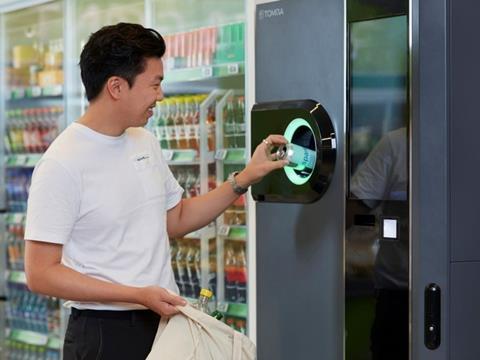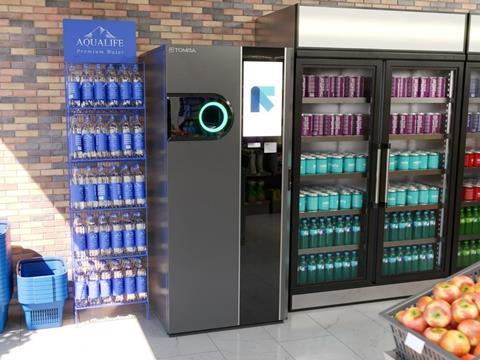
Reverse vending machine (RVM) manufacturer TOMRA Collection has launched its new Basic Line for stores new to participating in deposit return systems (DRS), designed to offer a simple way for retailers to start collecting empty beverage containers for recycling while saving space and resources.
The first product in the Basic Line is the TOMRA B5 Combi, which apparently has a footprint of 0.8 square meters for small stores or locations with limited space to accommodate additional retail equipment. It also has a 21.5” touch display, aiming to be user-friendly for consumers who are new to deposit return. The free-standing RVM can collect a combination of plastic bottles and cans in two different bins inside the machine, or just one bin for one material type.
TOMRA B5 Combi is launching first in Ireland, the latest region to introduce a DRS, which went live on 1st February. The system requires retailers to take back drink containers and refund deposits as part of the country’s efforts to reduce litter and increase recycling rates. The Basic Line is powered by TOMRA Essential Technology, which utilizes 360° barcode scanning, an integrated camera, and precise weight and metal sensors, to recognize various objects and brands, and ensure accurate refunds.
The next machine in the Basic Line is the TOMRA B5 Flaker, debuting in France. This RVM shreds the returned PET beverage bottles into small pieces, so that the plastic is in a ready format for retailers to send directly to recyclers. More products are expected in the Basic Line in 2024, including TOMRA B5 SoftDrop for accepting refillable glass bottles.
“Retailers play a vital role in DRS, as the location where consumers both buy and return drink containers. The Basic Line offers a simple start to recycling, with a space-efficient solution that can help retailers be compliant with a DRS and optimize their operations,” said Elsa Sørensen, product manager for the Basic Line at TOMRA Collection.

With the introduction of the DRS scheme in Ireland, research conducted by Every Can Counts suggests that 29% of consumers in the Republic of Ireland are unsure how to use it. Other potential deterrents to participating in the scheme include 36% of respondents expressing their concern about not having enough space to store uncrushed drink containers and 17% believing there are too many steps to follow.
On the other hand, nearly seven in ten (69%) believe it will encourage them to recycle more, and over three-quarters (78%) claim they are more likely to buy a drink container they believe to be recyclable, including aluminium cans and plastic and glass bottles.
Elsewhere, Hungary has launched its new DRS scheme for single-use drink containers in a collaboration between TOMRA and central system administrator MOL Hulladékgazdálkodási Zrt. (MOHU), a move hoped to optimize the process of returning used packaging for new recyclers. Excluding milk and milk-based beverages, the DRS accepts single-use aluminium cans and glass or plastic bottles for ready-to-drink or concentrated beverages. A deposit of 50 Hungarian forint (approximately €0.13) is paid by consumers when they purchase an eligible drink, and refunded when the empty container is returned for recycling, at grocery retailers exceeding 400m2 in size as well as voluntary and manual sites.
If you liked this story, you might also enjoy:
The Brief: How viable is biorecycling for plastics?
Report: How the top brands are progressing on packaging sustainability
The Brief: Using ocean-bound plastic in packaging – how, why and should we?


















No comments yet